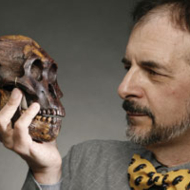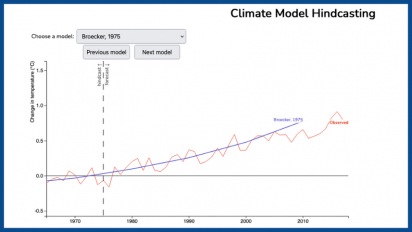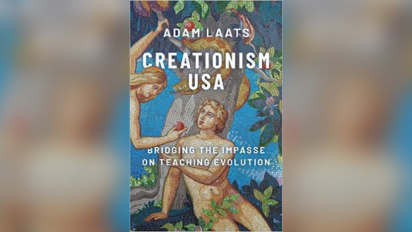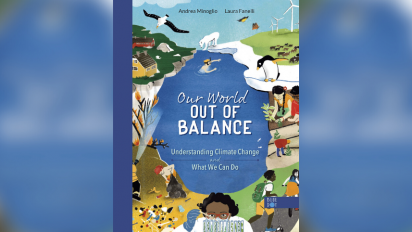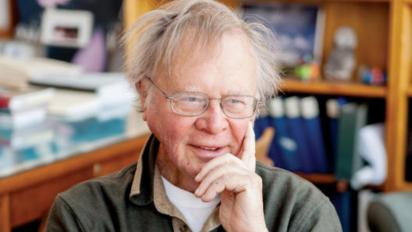Creationism USA: Bridging the Impasse on Teaching Evolution
Author Adam Laats argues that "we are failing to understand what creationists want from science education," our reviewer writes.
In Creationism USA, the historian of education Adam Laats surveys the history of the creationism/evolution controversy in the United States with an eye toward drawing a moral for alleviating the controversy in the future.
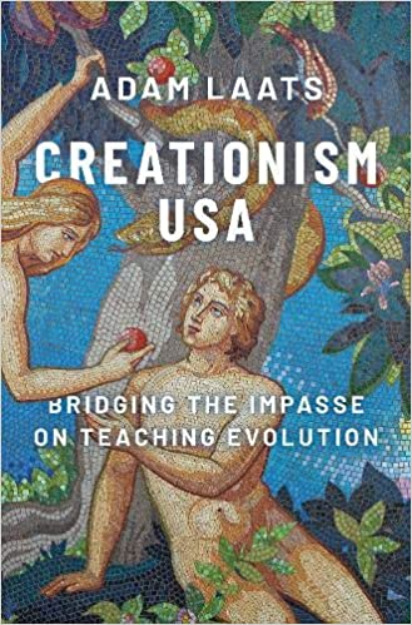 To begin, Laats reminds us that support for creationism in public opinion polls shows barely any movement since Gallup’s first poll in the early 1980s. Newer polls asking better questions show stronger evolution acceptance than Gallup’s, but after all the effort that evolution’s supporters have put into improving evolution education (and science education in general), the scant change in the public’s position suggests that those of us who support and promote evolution education are doing something wrong.
To begin, Laats reminds us that support for creationism in public opinion polls shows barely any movement since Gallup’s first poll in the early 1980s. Newer polls asking better questions show stronger evolution acceptance than Gallup’s, but after all the effort that evolution’s supporters have put into improving evolution education (and science education in general), the scant change in the public’s position suggests that those of us who support and promote evolution education are doing something wrong.
What are we doing wrong? In effect, Laats suggests that we are failing to understand what creationists want from science education. It is easy to be distracted by the culture-wars battles that surround big court cases or legislative and school board actions. These are problematic, but Laats argues that they are fomented by representatives of a minority position that he labels “radical” creationism. Yes, these folks really do want to remove evolution from the schools, from the culture, and from the face of the Earth if possible. They are, however, only a small proportion of people who acknowledge a deity in charge of the universe when they answer public opinion polls. Readers may be surprised to learn Laats’s conclusion that these creationists do want their children to learn evol tion, and to learn it well and correctly.
To be sure, not all of Laats’s non-radical creationists wholeheartedly accept evolution, but as a rule, their objections are not to the science proper but to what they regard as its consequences. Laats uncovers this same theme repeatedly. In the chapter entitled “Evolution and All That,” he writes, “[F]or a lot of Christian creationists, it is not evolution they hate, but rather the theological implications that they associate with it” (p. 47). They like, or at least tolerate, evolutionary science, but they hate the “all that” — that there is no purpose in evolution (and therefore that humans are not its pinnacle), that modern evolutionary science is more about process than progress, that evolutionary science might be used in making decisions about life and society that they disagree with.
This latter “all that” is at the basis of some of radical creationism’s strategies to win over the non-radical majority. The radical creationists argue that science — particularly evolutionary science — is atheistic, and they blame many of the trends to- ward secularization and cultural diversity in the post-World-War-II U.S. on “belief in” evolution. So what will people of faith (who accept a Creator God if not necessarily the historicity of Genesis) choose when presented with the choice that radical creationists force on them: creationism/salvation or evolution/damnation?
Yes, it is a false dichotomy. But it is an effective one. One of the best features of this book is Laats’s chronicle of the events that fueled the emergence of this radical creationist strategy during what he calls the times when the “world broke apart.” These were watershed events that changed the role of religion in public life: some court cases, some changes in curriculum in the schools, and some demographic shifts. Prior to these events, Laats points out, public institutions (such as schools and governments) reflected the religious beliefs and practices of a theologically conservative Protestant majority, at least in a generic way. Teachers and public officials led prayers or Bible readings in classrooms and at government functions.
These apparently slight changes marked a momentous shift to a public view of religion that offered to respect different religious views, but not to reflect any one of them as an “official” (or quasi-official) position for public institutions. This trend accelerated in the late 1950s and early 1960s, coinciding with an emphasis on more, and more modern, science instruction, and so radical creationists found evolutionary science — now forming an integral part of the increased emphasis on science education — to be a handy foil for their resistance to the trend away from a public religiosity.
Radical creationists framed their argument by focusing on the “science” (for example, “evidence[s] against” or “strengths and weaknesses of” evolution), and we took the bait; we argued about the science. But science is not the issue. The main battleground is for the control of the institutions responsible for teaching our children American civic values. This is where the common ground is to be found: making our children (and ourselves) decent, responsible, and honorable citizens. And that is where we can win over people who love God and also love science and even evolution, and maybe even move the needle on those opinion polls.
If we take no other message from this book, it should be this: we need to make it clear to the non-radical contingent of creationists that evolution education does not threaten their values. But the starting point of this process is to listen to what creationists really are saying about their con- cerns about the place of evolution in public life. If you are interested in promoting the acceptance of evolution among the general public, you should read this book!
This version might differ slightly from the print publication.

